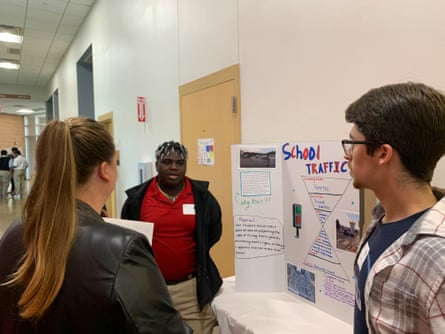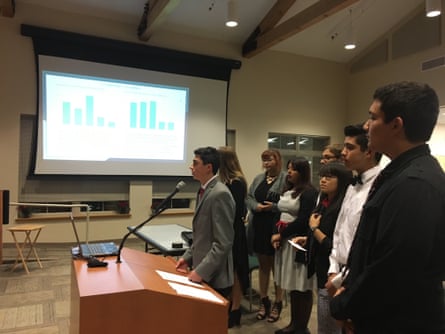The defining experience of Jordan Zamora-Garcia’s high school career – a hands-on group project in civics class that spurred a new city ordinance in his Austin suburb – would now violate Texas law.
Since Texas lawmakers in 2021 passed a ban on lessons teaching that any one group is “inherently racist, sexist or oppressive”, a little-noticed provision of that legislation has triggered a massive fallout for civics education across the state.
Tucked into page 8 is a stipulation outlawing all assignments involving “direct communication” between students and their federal, state or local officials – short-circuiting the training young Texans receive to participate in democracy itself.
Zamora-Garcia’s 2017 project to add student advisers to the city council, and others like it involving research and meetings with elected representatives, would stand in direct violation.
Since 2021, 18 states have passed laws restricting teachings on race and gender. But Texas is the only one nationwide to suppress students’ interactions with elected officials in class projects, according to researchers at the free expression advocacy group Pen America.
Practically overnight, a growing movement to engage Texas students in real-world civics lessons evaporated. Teachers canceled time-honored assignments, districts reversed expansion plans with a celebrated civics education provider and a bill promoting student civics projects that received bipartisan support in 2019 was suddenly dead in the water.
“By the time we got to 2021, civics was the latest weapon in the culture wars,” state representative James Talarico, sponsor of that now defunct bill, said.
Texas does require high schoolers to take a semester of government and a semester of economics, and is one of 38 states nationwide that mandates at least a semester of civics. But students told the 74 the courses typically rely on book learning and memorization, without hands-on lessons in civic participation.
“Students are now banned from advocating for something like a stop sign in front of their school,” Talarico said.
Civics in retreat
The sections of the 2021 law limiting civic engagement pull directly from model legislation authored by the conservative scholar Stanley Kurtz, whose extensive writings seek to link an approach called “action civics” – what he calls “woke civics” – with leftist activism.
Kurtz argues the practice is a form of political “indoctrination” under the “deceptively soothing” heading of “civics”, a cause long celebrated on both the right and the left.
The action civics model was popularized by the nonprofit Generation Citizen and is used in more than a thousand classrooms across at least eight states. It teaches students about government by having them pick a local issue, research it and present their findings to officials.
The central philosophy is that “students learn civics best by doing civics”, Generation Citizen policy director Andrew Wilkes said.
Generation Citizen’s method has been studied by several academic researchers who found participants experienced boosted civic knowledge and improvements in related academic areas like history and English.
Kurtz, however, contends the projects “tilt overwhelmingly to the left”.
“Political protest and lobbying ought to be done by students outside of school hours, independently of any class projects or grades,” he said in an email to the 74.
Civics experts, however, argued otherwise.
The notion that “it’s activism happening in classrooms … that’s just so far from the truth,” said Kei Kawashima-Ginsberg, director of the Center for Information and Research on Civic Learning and Engagement at Tufts University in Boston.

Representative Steve Toth and Senator Bryan Hughes, the GOP lawmakers who sponsored the 2021 Texas classroom censorship legislation, did not respond to requests for comment.
The 74 reviewed more than three dozen action civics projects in Texas from before the 2021 legislation and found that the vast majority dealt with hyperlocal, nonpartisan issues.
Students most often took up causes like bullying, youth vaping, movie nights in the park or bringing back student newspapers. A handful in Austin and nearby Elgin could be considered progressive, including projects dealing with gun control or school admissions prioritizing diversity, topics educators said students selected based on their own interests.
Under the 2021 law, student participants in all of those projects now must avoid contact with elected officials. The restrictions have resulted in initiatives more contained to schools themselves like advocacy for less-crowded hallways or longer lunch periods, educators said.
It’s an effort to “tamp down the next generation of leaders”, said Armando Orduña, the Houston executive director of Latinos for Education.
Though some project-based civics lessons in Texas continue with a paired-down scope, others have disappeared altogether.
One school district north of Dallas decided “out of an abundance of caution” to reverse years of precedent and stop offering course credit to students involved in a well-regarded national civic engagement program, the Texas Tribune first reported.
And Generation Citizen, too, has seen its footprint in Texas dwindle.
After a 2017 launch in the state, the organization underwent several years of steady growth, with more than a half-dozen districts using its programming or curricula.
Austin schools expanded their contract with the nonprofit to $58,000, according to records the 74 obtained from the district through a freedom of information request. And Dallas said it wanted to bring Generation Citizen programming to every high schooler in its 153,000-student district, former regional director Meredith Stefos Norris said.
Then came the 2021 legislative session and “everything got turned upside down”, said Megan Brandon, Generation Citizen’s current Texas program director. It thwarted their organization’s efforts and districts backed out of partnerships.
The organization now primarily works with just three Texas districts, including an updated contract with Austin schools for $3,000 – a tiny sliver of the sum from a few years prior.
Brandon, a former social studies teacher herself, grieves for the youth in her state. Her students in Bastrop outside Austin, most of whom did not have parents who attended college, never had access to civic engagement opportunities before her class, she said.
“Students in Texas need civics more than students in many other states,” she said. “It feels like we’re going backwards in time.”
‘It made me feel important’
Zamora-Garcia, Brandon’s former student whose youth representation quest changed a city ordinance, said the experience, now inaccessible to Texas students, had a profound impact on his academic career.
“It made me feel more important and more involved, actually being able to have a voice that can make a change,” the Texas State University junior said. Beforehand, school had felt more like being a “cog in a machine”.

Mabel Zhu, who took the same class two years later, said the experience was “life-changing”, igniting her passion for civic engagement for years to come.
After the class, she began working with local nonprofits and served as the youth adviser on the Bastrop city council. She collaborated with the Cultural Arts Board to put up a mural that will define her city’s downtown space for years to come. A waving flag on the painting proclaims: “The future is ours!”
“Without [the class], I wouldn’t have been able to make such an impact within my community,” Zhu said.
But now, Tufts’s Kawashima-Ginsberg says, the new law may result in a generation of Texans growing up with a stunted sense of citizenship.
“It’s going to really damage their idea of what democracy is,” she said.
-
This report was first published by the 74, a nonprofit, nonpartisan news site covering education in America
Stay connected with us on social media platform for instant update click here to join our Twitter, & Facebook
We are now on Telegram. Click here to join our channel (@TechiUpdate) and stay updated with the latest Technology headlines.
For all the latest Education News Click Here
